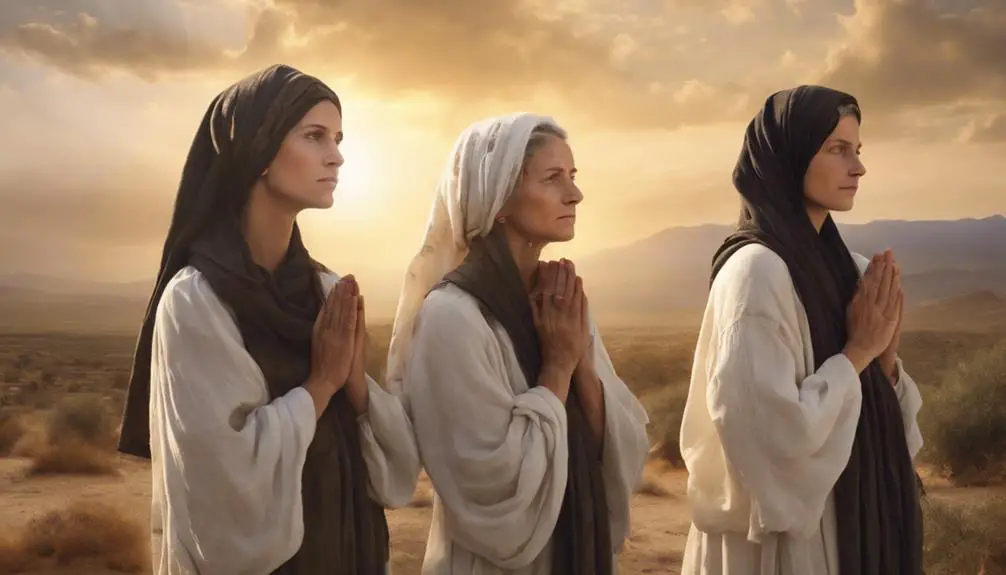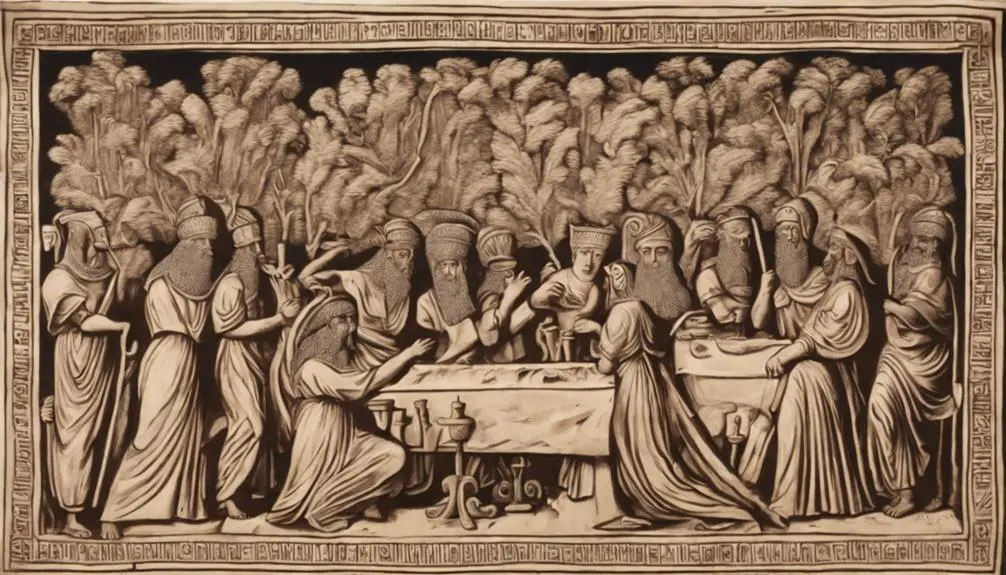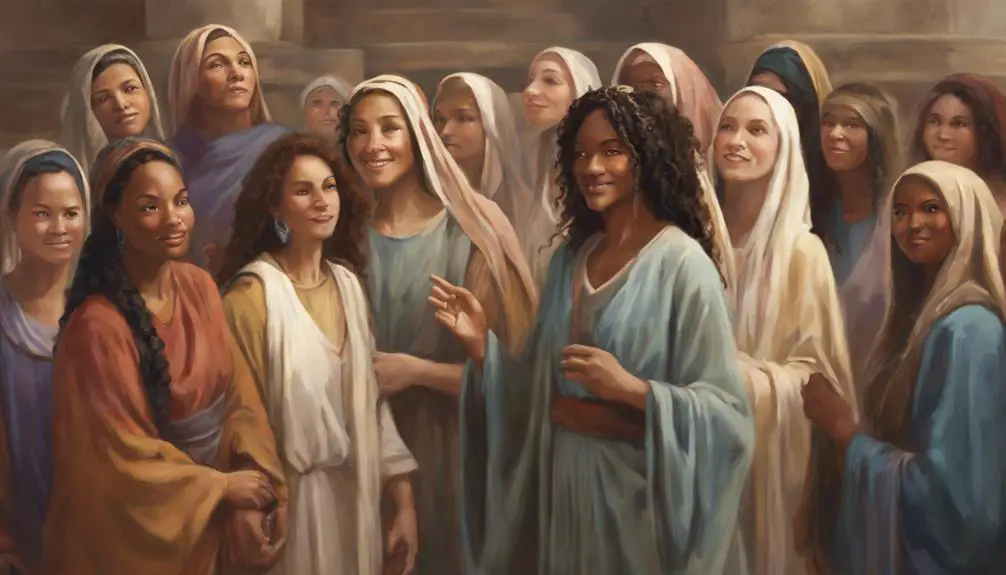Biblical mystery unraveled: Delve into the less-explored, intriguing world of female Nazarites in ancient religious practices.

Female Nazarites in the Bible
Isn't it an intriguing coincidence that while the Bible frequently refers to male Nazarites, it's less explicit about their female counterparts? You might be wondering, were there female Nazarites, and if so, what was their role?
This topic is not only enlightening but also serves as a window into the nuanced gender narratives within biblical times. This exploration could challenge your current understanding and prompt a deeper contemplation of gender roles in ancient religious practices.
So, are you ready to unravel this mysterious aspect of biblical history?
Understanding the Nazarite Vow

Before delving into the role of female Nazarites in the Bible, it's crucial to grasp what the Nazarite vow actually entails. This vow was a voluntary pledge taken by men and, as we'll see later, women, who felt called to live a life of consecration and dedication to God. The vow's significance lay in its three key prohibitions: abstaining from wine and other grape products, refraining from cutting one's hair, and avoiding contact with the dead.
However, Nazarite misconceptions abound. You might think that all Nazarites were lifelong devotees, but this wasn't always the case. While some, like Samson or Samuel, were Nazarites from birth, others chose to take the vow for a specific period. It's also important to debunk the myth that Nazarites were spiritual elites or hermits. They lived among the community, partaking in everyday activities.
Understanding the Nazarite vow is essential to appreciating the commitment it represented. It's a testament to an individual's resolve to dedicate their life to spiritual ideals, despite societal norms or personal desires. For female Nazarites, this vow held an even greater weight, challenging cultural expectations and gender norms of their time.
Biblical References to Female Nazarites

To fully grasp the role of female Nazarites, let's delve into specific biblical references where their presence and influence are distinctly evident. The book of Numbers 6:2 states, 'Speak to the sons of Israel, and say to them, 'When either a man or a woman makes a special vow, the vow of a Nazarite, to separate himself to the Lord.'' This verse undeniably includes women as potential Nazarites, underscoring Nazarite symbolism of holiness and dedication to God, irrespective of gender.
The story of Samson's mother (Judges 13), a woman who followed Nazarite laws during her pregnancy, provides another example of female participation in the Nazarite vow. She, though unnamed, becomes a subject of biblical interpretations, highlighting the significant role that women held within this unique religious sect.
Finally, the reference of the daughter of Jephthah in Judges 11 also offers a glimpse of women's involvement with Nazarite vows. Although there's ambiguity around her status as a Nazarite, her dedication to God's service clearly echoes the Nazarite symbolism of consecration.
Thus, while explicit references to female Nazarites are limited, their implied presence significantly enriches our understanding of biblical narratives.
The Role of Female Nazarites

Delving into the role of female Nazarites, it's crucial to recognize that they're not just silent figures in the background; rather, they're active participants in their religious commitment, often navigating within the constraints of societal norms to express their devotion to God.
They're subjected to Nazarite Women's Restrictions, such as abstaining from wine, cutting their hair, and avoiding contact with the dead. Yet, despite these constraints, they wield significant influence in their communities. The Female Nazarites' influence can be seen in their commitment to pursuing spiritual purity, thereby setting an example for others.
Here's a table summarizing key aspects of their role:
Aspect |
Implication |
Significance |
|---|---|---|
Nazarite Women's Restrictions |
Abstain from wine, don't cut hair, avoid dead |
Spiritual purity |
Female Nazarites' Influence |
Set examples, inspire others |
Societal impact |
Devotion to God |
Navigating societal constraints |
Religious commitment |
Notable Female Nazarites in Scripture

In the realm of scripture, several female Nazarites stand out for their devout commitment and significant societal impact. They've dealt with unique challenges and embodied the Nazarite symbolism in their lives.
- Samson's Mother: Before Samson's birth, an angel of the Lord appeared to her, declaring that her yet-to-be-born son should be a Nazarite from birth. This makes her indirectly a part of the Nazarite vow, as she'd to abide by the restrictions during her pregnancy.
- Hannah: Samuel's mother, Hannah, made a vow before the Lord that if she bore a son, he'd be dedicated as a Nazarite. Her commitment to this vow was a clear testament to her faith.
- Elizabeth: Mother of John the Baptist, she followed the Nazarite restrictions during her pregnancy, as instructed by an angel of the Lord.
- Mary: While not explicitly called a Nazarite, Mary's dedication to God and acceptance of the unique challenge of bearing God's son, carries the spirit of the Nazarite vow.
- Jephthah's Daughter: She willingly accepted her father's Nazarite vow, displaying a profound dedication to God's will.
These women's lives remind us that the Nazarite symbolism isn't just about the vow itself, but also about the commitment to God's purpose, despite the unique challenges.
Impact of Female Nazarites on Society

Through their faithful adherence to the Nazarite vow, female Nazarites have profoundly influenced societal norms and expectations, reshaping perceptions of women's roles in religious commitment and leadership. The Nazarite women's influence isn't only religious but also societal, as their dedication to their vows demonstrated women's capacity to be spiritual leaders and agents of change.
Your understanding of female Nazarites' societal repercussions is essential. These women served as a counter-narrative to the often male-centric religious practices of their time. They challenged the status quo and paved the way for greater female participation and leadership in religious matters.
In the broader societal context, they represented a shift in gender dynamics. Their vow-taking and religious commitment showcased women's spiritual strength and resilience, contradicting societal stereotypes about women's roles and capabilities. The Nazarite women's influence extended beyond religious circles, inspiring societal changes that encouraged greater gender equality and female empowerment.
Conclusion
So, what can we learn from these female Nazarites?
They were more than just women in the Bible; they were trailblazers, breaking social norms and influencing society.
They've shown us that everyone has a role in shaping history, regardless of gender.
Their commitment to their vows is a testament to their faith and determination.
Isn't it inspiring to see how these women, through their Nazarite vows, made significant impacts in their time?



Sign up